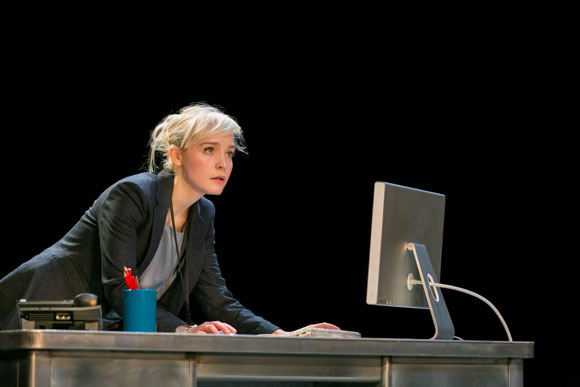Matt Trueman: Turn off Twitter and go to the theatre

© Johan Persson
Concentration has been on my (wandering) mind recently. A fortnight ago, the Observer ran a long article by the neuroscientist Daniel J. Levitin, arguing that the modern world – with its constant stream of social media and an endless array beeping, vibrating, swiping distractions – is doing our heads in.
Each time we check our email, Facebook, Twitter and Tinder accounts, our brain gets a hit of dopamine – a hormone that 'rewards' productivity and social behaviour. Trouble is, it's addictive and we end up hooked on social media, unable to focus on a task in hand for any length of time, always itching to check for new messages.
It's one of the things I most cherish about the theatre: the chance to meet a piece of art head on, with no outside interferences. The theatre is a space cut off from the rest of the world and there's something ritualistic about turning off your phone at the top end of a show. It's an investment of sorts, a pledge to be present as an audience member.
Other artforms don't give you that. They're much more blended into real life. You can half watch television, for instance, while cycling through your Twitter feed. Books, too, are picked up and put down, so that reading is interspersed with real life. There's something lovely about that, especially the way a novel can colour your world for a while, but it means that books are easily missed. If you're not in the right frame of mind, if you can't quite get into a story, it's easy to loathe something you might otherwise have loved. With theatre, it's just you and the show: everything else is absent.
I know of one director who spends rehearsals shouting the word, 'Boring.'
There's a kind of equality in that, a sense of standard viewing conditions, though it's fair to say some theatres aid concentration more than others. Personally, I find West End pros-arch theatres problematic; the frame always feels so artificial and the ornate décor around an auditorium can feel insistent and intrusive. On the other hand, even with all its hand-painted decoration, the Sam Wanamaker Playhouse is one of the most concentrated spaces in London. The combination of wood and candlelight – the fact that you have to slightly strain to see – firm seating to keep you alert and actors close enough to touch all makes for an extraordinary sense of focus.
I say all this having furrowed my brow through Tom Stoppard's latest last week. It's a taxing piece of thinking onstage, which folds in consciousness, faith, market economics, behavioural science, beauty, emotion and our inescapable subjectivity – amongst other things – in a complex, slippery argument. You don't so much follow along as try to keep up and the play requires an active concentration, a concerted effort. It rewards it too. The same thinking on the page or on TV would doubtless be diluted by other distractions. In theatre, for a short while, we can hold all those ideas together, even if only temporarily.
Perhaps that ability to hold your attention is the mark of a good show, maybe even the only mark. If your mind starts to meander, has a show failed? That depends on the show, of course, and there are artists that deliberately deploy boredom as an artistic strategy. On the other hand, I know of one director who so determined to make his shows distraction-proof that he spends rehearsals shouting the word, 'Boring.'
Now, ask me how many times I checked my emails…










